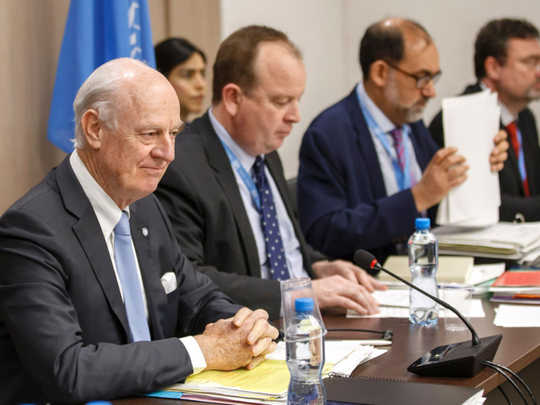
The Geneva Peace talks on Syria and the worsening situation in Libya were the two topics that dominated headlines in the region’s papers.
The talks in Geneva ended with the modest hope that the two sides to the conflict realise that dialogue is the only viable option left to settle the six-year old conflict, which has left nearly half-a-million people dead, said the Jordan Times. “For the time being, it is obvious that Syria’s fate is in the hands of the two sides at the negotiation table. When the dust finally settles in the country, its future will be decided by the Syrian people, who must be given the opportunity to exercise their right to self-determination freely.
Regional and international powers, all with vested interests, should abstain from playing out their fantasies vis-a-vis this old country and accept that only the Syrian people can decide its future. For Nazi Germany to control occupied France during the Second World War, it used some Frenchmen and formed a government of dummies, also called the Vichy government, in an attempt to legalise its presence. This is what the regime in Damascus is doing, London-based pan-Arab paper Asharq Al Awsat said.
“When the Syrian regime realised that the opposition had more legitimacy than it did, it resorted to a trick of inventing groups that claim to belong to the opposition. Then, the regime allowed these groups to work in Damascus and sent them to capitals like Tehran and Moscow to negotiate on behalf of the opposition. There is no point for the opposition, the High Negotiations Committee, to proceed after they had deprived it from everything, even the right to represent itself as an opposition. Everything that represents the regime is fake. The army isn’t its army and neither is the opposition, which it insists on negotiating with.”
According to Lebanon’s Daily Star, one might have thought — especially after the promises of several Nato countries — that Muammar Gaddafi’s demise would herald a new democratic era in Libya that suffered under Gaddafi’s thumb for 52 years.
“Libya, a member of Opec, should be an affluent country, and its people deserve to have the chance to benefit from its rich oil resources. Instead, we now have the situation where its oil terminals are fought over by rival militant groups, as Libyan turns on Libyan over the black gold that should be everyone’s to share. The future is indeed dim for the country, which is riddled with militias that are armed to the teeth and suffering from the presence of Daesh [self-proclaimed Islamic State of Iraq and the Levant] militants. One can only hope for a miracle, because unless all parties realise they must come together and give up their arms, things can get a lot worse.”
Fortunately, what happened last Thursday was not deaths at sea because of a shipwreck or sinking of boats carrying migrants; it was the rescue of 970 migrants off the coast of Libya, said the Saudi Gazette.
“Smuggling networks are well established in Libya, and the lack of an effective central government makes the job of traffickers easier. The ideal solution may be to stabilise Libya under a democratic administration. That is not likely to happen in the near future. The next best solution is to create conditions in which refugees can travel to Europe safely. The UNHCR did the right thing in calling on Europe to provide increased regular pathways for [the] admission of refugees and asylum. Smuggling networks need to be eliminated. But in the absence of sufficient alternatives, Europe may cause more human suffering including deaths at sea and what happened on Thursday may prove an exception.”




_resources1_16a31069e4e_small.jpg)







